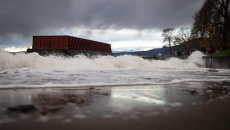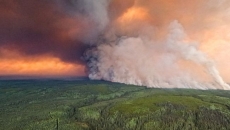The long-promised cap on greenhouse gas emissions for Canada's oil and gas sector will begin as early as 2026 and use a cap-and-trade system that applies by facility, a federal government source said Wednesday.
The outline for the policy that the government is set to publish Thursday will show that industry will not be asked to cut emissions as deeply as planned under last year's emissions reduction report, said the source.
This will help ensure the framework for the cap is feasible and targets pollution, not production, said the source, who spoke to The Canadian Press on the condition of anonymity to discuss matters not yet made public.
The policy will outline how the cap will work and that it is intended to begin applying sometime between 2026 and 2030. Draft regulations will come by spring 2024, with final regulations likely to arrive early in 2025.
The cap takes into account the expectation that production of oil and gas in Canada will go up before it starts to decline after global demand peaks. For oil specifically, that is predicted to happen before the end of this decade.
Natural Resources Minister Jonathan Wilkinson would not provide any details of the emissions cap policy this week, but did say Tuesday before the Liberal cabinet meeting that the cap "is structured in such a way that we are focused on what is technically feasible" without cutting production.
"Eventually we will see declines in global demand, but that’s not happening right now, so absolutely, that is not the intent, and that is not going to be the effect," he said.
Wilkinson is expected to discuss the cap at a news conference in Ottawa on Thursday morning, while Environment Minister Steven Guilbeault promotes it at the COP28 global climate talks in Dubai.
Great to be at #MRC2023 today.
— Jonathan Wilkinson 🇨🇦 (@JonathanWNV) December 6, 2023
The climate imperative has created an enormous economic opportunity globally, and Canada is well-positioned to seize the moment.
From wind power to SMRs, the future of clean technology is right here in Canada. https://t.co/rfMeoWiD5O
The oil and gas cap is a critical piece of Canada's emissions reduction plan, with the sector accounting for 28 per cent of Canada's total emissions in 2021. Canada emitted 670 million tonnes that year in total. It aims to cut that to less than 439 million tonnes by 2030.
The emissions reduction plan, which laid out a sector-by-sector list of what each industry needs to do to help reach that goal, wanted oil and gas to cut its emissions by more than 42 per cent from 2021 levels, to 110 million tonnes.
Industry has been clear it cannot achieve that without also cutting production. The Pathways Alliance, which represents the biggest oilsands companies, said it would take until at least 2035 to achieve the government's target.
Alberta Premier Danielle Smith has promised to challenge any emissions cap on the grounds that Ottawa has no jurisdiction over production, because provinces are the sole authorities over developing their natural resources.
The targeted cut under the emissions cap will fall somewhere between the government's initial estimate and what the industry has said it can achieve.
The government believes the new target is feasible with existing technology, largely carbon capture and storage systems and reductions to methane emissions mainly from conventional oil and gas wells.
Earlier this week, Canada outlined new regulations specifically to cut methane from the oil and gas sector by at least 75 per cent over 2012 levels by 2030. Those cuts will be a key part of the overall emissions cap.
Methane makes up about 30 per cent of total emissions from the oil and gas sector.
The cap will use a cap-and-trade system where a baseline amount of emissions will be set and then divvied up between various producers depending on the size of their operation and current emissions. There will also be a "compliance flexibility" amount, where companies can buy offset credits or contribute to a decarbonization fund, if they cannot cut their emissions enough to meet the cap.
A 2022 discussion paper on the oil and gas cap listed cap-and-trade, or a carbon price specific to the oil and gas industry to regulate the cap. The government has chosen cap-and-trade, believing it to be more predictable for industry in terms of its individual emissions allowances.
A spokesman for the Pathways Alliance said it would not be commenting until it sees the actual framework. A background document sent by the organization earlier this week notes that while total emissions from oil and gas have increased since 2005, production has also soared.
The oilsands industry has invested to reduce the emissions created to produce each barrel by 23 per cent since 2009.
Pathways companies, including Cenovus and Suncor, have committed to spending $16.5 billion to build a major carbon capture project for the oilsands.
Guilbeault has been harshly critical of oil and gas companies for not using more of the record profits they've had over the last years of higher oil prices to invest more heavily in decarbonization.
Keith Stewart, a senior energy strategist at Greenpeace Canada, said Wednesday it's not great that the policy has been watered down from the original cap number, but is happy to finally see any kind of cap.
"It's obviously not as much as we had hoped for," he said. "The oil industry has achieved some concessions from the government."
Stewart said history won't judge oil companies kindly for getting the cap watered down.
Environment groups have previously criticized the government for delaying the emissions cap and said even the original goal of 110 million tonnes in 2030 wasn't forcing the industry to do its fair share.
Stewart said raising the cap but still meeting 2030 targets means other sectors, or individuals, will have to do more.
"This is asking everybody else to pick up the slack for companies whose record profits are part of what is driving up inflation," said Stewart.






